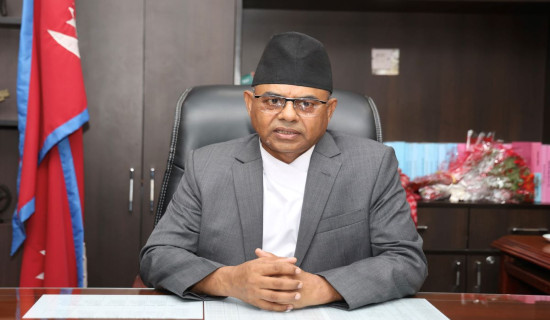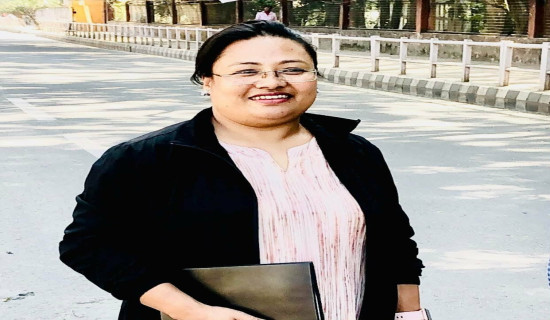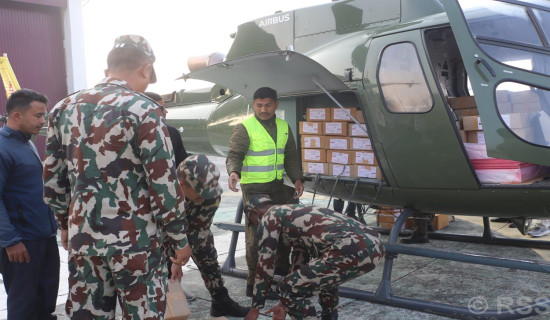- Thursday, 26 February 2026
Poll Reform Bill To Enhance Inclusion
Electoral system shows how a country has adopted free, fair and credible elections, substantially and procedurally. Substantial laws are always important to guide election process in a democratic country. The Constitution of Nepal, promulgated in 2015, has the provision of mixed electoral system of proportional representation (PR) and direct elections called first-past-the-post (FPTP). However, the nation had already exercised the mixed electoral system during the elections to the Constituent Assembly (CA) under the Interim Constitution 2007. The guiding document of the electoral laws in is the national charter which inserts provision of inclusion under mixed electoral system.
Inclusion is not merely a representation, rather it is a broader aspect of empowering people belonging to all castes, regions, religions and classes and bringing them into mainstream with their meaningful participation in the process of decision-making. Thus, inclusion demands proportional representation of all communities as per the socio-economic structure of the nation. Meanwhile, the Election Commission of Nepal (ECN) has drafted an integrated law called Election Management Bill, 2023 by incorporating national and international experiences. The national election body is now collecting suggestions from different stakeholders for making reforms in the election laws. Inclusion is one of the agendas of the People's Movement of 2006.
Proactive role
There are several ways to ensure inclusion and election is one of them. The ECN's effort alone may not be sufficient for this. However, concerned stakeholders like political parties, government and even voters should play proactive role in making the ECN's effort a success under existing constitutional framework. This is time to review election law by learning lessons from the past. New laws should also secure the rights of the people living abroad, differently abled eligible voters, illiterate persons and various clustered communities recognised by the existing laws as well as the constitution. The proposed bill aims to increase the number of votes and candidacies from marginalised communities.
The new Election Management Bill has proposed at least 33 per cent of party candidates for constituency seats for the House of Representatives, and Provincial Assemblies must be women and at least 33 per cent of every party’s candidates for ward chairs should be women. This provision encourages more women candidates. This provision is inserted in the proposed new bill because having only a candidacy quota for constituency seats may not be sufficient to enable more women to be elected.
The representative democracy can be better consolidated while ensuring that women win at least the quota of constituency seats by using methods such as requiring parties to select women candidates in a minimum number of winnable constituencies, or providing higher canvassing funding limits or other incentives to parties to select women in winnable constituencies, rather than by reserving specific constituencies for women candidates only.
As per the new provision, women candidates will also benefit from the existing 50 per cent discount on deposit available to them, and the new Bill extends this to gender and sexual minorities and persons with disabilities. The Bill has proposed that each party must nominate a woman for either the mayor or deputy mayor in municipality and either the chair or deputy chair in rural municipality. If a party nominates a candidate for only one of these positions, it must be a woman. This provision discourages the political parties which tried to evade women's representation while filing candidacy during pre-election coalition.
Also at the local level, if there are no Dalit women nominated for the seat reserved for them in the ward, the candidacy is given to a minority woman, to reduce the possibility that the seat will be left vacant. The Bill has proposed that gender and sexual minorities and persons with disabilities should be included in each party's closed list for the proportional representation system of elections.
Likewise, the Bill states that polling centres must be favourable for people with disabilities. The ECN will need to determine what disable-friendly means. The ECN has made progress in making polling centres more accessible, but still at least half of them have some barrier to persons with disabilities. The new Bill has tried to promote inclusion under the given constitutional framework and more provisions should be incorporated through regulations and by-laws.
Permission
The Bill has the provision that after a polling officer gives permission, senior citizens and voters with a disability can choose any other citizen with an ID card to assist them to vote, if needed. This means that the persons with a disability would no longer have to use a family member as an assistant. Some voters may be uncomfortable with their family as they do not want their family to know their voting choice. Each assistant can only a voter.
The Bill proposes that public transportation on the election day is regulated and managed rather than banned, thus making polling centres more accessible to voters. The new integrated Election Management Bill not only attempts to improve the electoral system but also helps consolidate representative democracy by ensuring inclusion under the existing constitutional framework.
(Upadhyaya is Associate Editor at TRN)

















